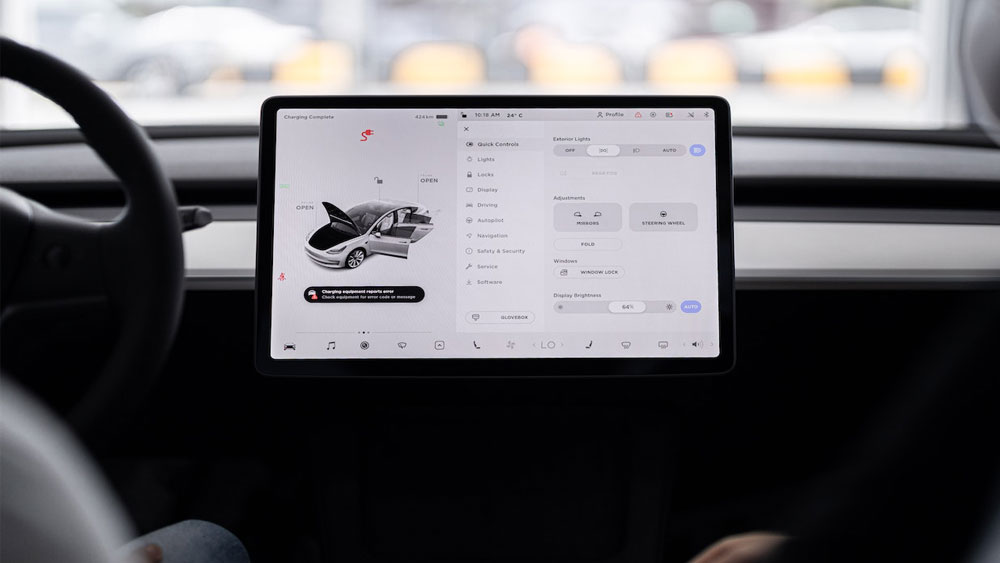Top Picks for the Best Self-Driving Cars of 2024: Driving into the Future

Now with the advancement of Technology and Artificial intelligence (AI). AI has been improving the lifestyle of people & taking over the work burden from humans. Driving a car was also hectic and demanding for extended adventures.
To tackle these concerns, companies have employed cutting-edge technologies like neural networks, machine learning, artificial intelligence, and deep learning algorithms in combination with sensors and cameras. This integration allows for reduced driver interaction and enables cars to operate independently.
Referred to as self-driving or autonomous cars, the concept of such vehicles may appear contemporary; however, it has actually been in existence for nearly a century. In 1920, the engineer, “Francis Hudina,” invented an electric car, which he was able to control remotely. However, the project failed because he lost control of the car multiple times.
Despite this setback, self-driving cars have since made remarkable progress in terms of safety and reliability, revolutionizing the entire automobile industry by significantly reducing the risk of accidents.
In this narrative, allow me to guide you through the advantages offered by self-driving cars, introduce you to their leading manufacturers, and highlight some of the best autonomous vehicles available today.
So what’s the wait? Let’s start & explore the new world of automobiles.
Benefits of Autonomous Cars
Self-driving cars can perform driving tasks without the control of humans. Let’s explore some of the advantages of these cars:
- Such cars are equipped with sensors and AI algorithms that are very fast and responsive. Engineers have been working on machines that give output simultaneously. Best self-driving cars detect and respond to potential hazards more effectively than human drives, reducing the risk of injuries. They are safe and reliable cars.
- Since these cars are self-driven, it removes the traffic tension from an individual. These cars can move on their own and create a synchronized flow of traffic that results in smooth traffic patterns.
- These cars are highly inclusive and provide mobility to people with disability. Such cars follow the standards set by the ADA ( Americans with Disabilities Act), which makes transportation accessible for all members.
- These cars have also been shown to be very efficient on fuel other than traditional cars. With that, autonomous vehicles give a very economical, affordable, and enhancing driving experience.
- Besides providing a comfortable environment, AVs allow you to utilize your travel time. You can attend meetings, read, or work while your car is self-driven.
- These cars are not as fast as supercars. However, they are designed to optimize driving patterns and lower emissions that, contribute to the sustainability of the environment.
Best Self-Driving Car Companies
Let’s look at the companies offering the best self-driving cars, contributing to the revolutions of the automobile industry, and innovating the driving experience.
1. Waymo
Waymo is one of the first companies that started autonomous vehicles, and they are a subsidiary of Alphabet Inc. which is Google’s parent company. With this innovation, they have conducted extensive testing and research on the cars. As a result, they have manufactured some of the advanced vehicles and taxis without very exceptional drivers.
2. Tesla
With it comes to electric cars, the first person that comes to mind is Elon Musk, who founded the Tesla company. Tesla’s work in manufacturing electric vehicles needs no introduction. The autopilot feature in these cars contributes to the best self-driving cars. Their colored cars put a charming experience on the people.
3. Cruise
Cruise is another autonomous car manufacturer nourishing and putting a lot of effort into innovating in the car industry. The cruise company was 2013, and they are a part of General Motors. Their driverless taxis are prevalent as they have put a lot of emphasis on safety and sustainability.
4. Mercedes Benz Group
We have all heard about the luxurious and most splendid supercars by the Mercedes company. Now they are making their mark in self-driving cars as well. They have deep learning and artificial intelligence expertise and provide the most effective sensors and perception modeling. Their S-class cars showcase both innovation and luxury at the same time.
5. Uber:
Uber, a globally recognized ride-hailing service, has recently entered the realm of self-driving car services. Their ambitious goal is to revolutionize urban transportation. By forging partnerships with established autonomous technology companies like Waymo, Uber strategically taps into their experience.
The company is determined to provide autonomous ride-sharing services, which will revolutionize the way people commute in urban environments. Uber’s investments in self-driving technology are positioned to play a crucial role in shaping the future of urban mobility.
6. Apple Autonomous:
Apple, the tech giant, has delved into the autonomous vehicle realm through its self-driving car project. This undertaking has garnered immense attention and sparked widespread speculation. While specific details surrounding Apple’s foray into autonomous vehicles are closely guarded, their involvement undeniably signifies a significant transformation within the industry landscape.
7. Amazon Autonomous:
E-commerce titan Amazon has ventured into self-driving technology to enhance its logistics and delivery operations. Amazon’s investment in autonomous vehicles signifies the growing importance of efficient and reliable autonomous delivery services. The company’s focus on automation in transportation highlights the potential for self-driving technology to reshape last-mile logistics and create more sustainable delivery systems.
Best Self-Driving Cars in 2024
As the automotive industry continues to pivot toward electric and autonomous vehicles, here are the top self-driving cars to consider in 2023, each offering a unique blend of innovation, safety, and performance:
1. Tesla Model S:
The Model S is equipped with state-of-the-art hardware and software, including Tesla’s advanced Autopilot system. This combination offers an unparalleled autonomous driving experience.
Not only does it provide autonomy, but it is also environmentally friendly, with impressive range variants offering up to 400 miles on a single charge.
Additionally, its spacious interior and innovative touchscreen controls, complemented by its sleek design, firmly establish the Model S as a standout in the luxury electric vehicle market.
2. Nissan Leaf:
The Nissan Leaf combines affordability with semi-autonomous capabilities, thanks to its Pro-Pilot option.
The Leaf’s battery-electric powertrain guarantees emission-free driving, making a positive contribution to the environment.
Its appealing design and practicality make it an ideal option for individuals in search of an environmentally conscious and budget-friendly self-driving car.
3. Tesla Model 3:
Tesla’s Model 3 serves as an accessible entryway into the realm of self-driving vehicles, ensuring both safety and high performance without compromise.
Its impressive range, efficient electric powertrain, and Tesla’s Autopilot technology make it a compelling option for those seeking semi-autonomous capabilities without breaking the bank.
The Model 3’s minimalist interior and responsive handling further enhance the driving experience.
4. Waymo One:
Waymo One, part of Alphabet Inc., offers an extensive ride-hailing service featuring fully autonomous vehicles.
Passengers can enjoy a hands-free journey while Waymo’s cutting-edge technology handles every aspect of driving.
Waymo’s commitment to safety and rigorous testing makes it a trusted choice for those looking to experience fully autonomous transportation.
5. BMW 7 Series:
BMW’s 7 Series combines luxury and cutting-edge autonomous features, showcasing the brand’s utmost dedication to self-driving innovation.
The vehicle boasts an array of advanced driver-assistance systems, including adaptive cruise control, lane-keeping assistance, and a diverse range of semi-autonomous driving modes.
Step inside the plush and technologically sophisticated cabin of the 7 Series which caters perfectly to those who value both comfort and unrivaled performance.
6. Audi A8:
The Audi A8 provides a hands-free driving experience in specific traffic conditions, thanks to its AI Traffic Jam pilot.
Radar and sensor technology work in tandem to offer a seamless semi-autonomous experience, making highway cruising more convenient.
Audi’s commitment to luxury and innovative technology is evident in the A8’s design and features.
7. Volvo XC90:
Volvo’s XC90 incorporates the Pilot Assist system, offering a taste of autonomous driving with adaptive cruise control and lane-keeping assistance.
Its focus on safety is a hallmark of the brand, making the XC90 a family-friendly choice.
The XC90’s elegant Scandinavian design and spacious interior add to its appeal.
8. Ford Mustang Mach-E:
Ford’s entry into the electric SUV market, the Mustang Mach-E, offers captivating driver assistance features, including a comprehensive semi-autonomous driving package.
This electric SUV combines Mustang-inspired design with practicality, catering to those seeking a mix of performance and sustainability.
The Mach-E’s roomy interior and impressive tech features make it a versatile option.
9. Mercedes-Benz S-Class:
The Mercedes-Benz S-Class offers a seamless blend of luxury and cutting-edge self-driving technology. It boasts advanced features like distance assist and active steering, providing an elevated driving experience.
Its opulent interior, cutting-edge technology, and refined driving experience make it a statement of elegance and innovation.
The S-Class is ideal for those who prioritize comfort and innovation in their autonomous driving experience.
10. Google Autonomous Car:
Google’s self-driving car project, now part of Waymo, is continuously advancing in autonomous technology. They are dedicated to creating innovative and safe vehicles, prioritizing cutting-edge features.
Waymo’s strong focus on data-driven decision-making and rigorous testing guarantees a high level of safety and reliability.
While the specifics of their vehicle offerings may evolve, Google’s commitment to autonomous technology remains unwavering.
11. Hyundai Autonomous Vehicles:
Hyundai has joined the autonomous vehicle market, emphasizing advanced driver-assistance systems and envisioning a future of self-driving transportation.
Their vehicles integrate cutting-edge sensors and AI technology, delivering a dependable and efficient autonomous driving experience.
Hyundai’s commitment to quality and affordability shines through in their autonomous offerings, attracting a diverse range of consumers.
12. Cadillac Escalade:
The Escalade stands out as a premier option for those seeking a spacious and opulent SUV thanks to impressive engine power and advanced technological features. It offers attractive entertainment options and generous seating across all three rows.
You’ll find the Super Cruise system as an option for the Escalade. GM Super Cruise enables hands-free driving on compatible roads.
Equipped with an in-cabin camera, this Cadillac observes the driver. Super Cruise activation relies on the driver-monitoring system confirming your attention to the road.
The Premium Luxury represents the most budget-friendly trim featuring Super Cruise capability. Opting for the Super Cruise package increases the price of this trim by $2,500.
Conclusion:
Self-driving cars have revolutionized the automotive industry and our whole perception of driving. In addition, these vehicles are poised to bring about a remarkable transformation in the realm of smart transportation, optimizing its efficiency and reliability.
Many prominent companies are working and trying to provide the perfect and completely autonomous car. Top manufacturers such as Waymo, Tesla, Cruise, Mercedes Benz, and Uber provide a variety of impressive AVs that are both unique and innovative. So what’s stopping you? Invest in the best self-driving car for a convenient driving experience and environmental sustainability.

news via inbox
Sign up and never miss out on the latest news and updates at HighStuff




